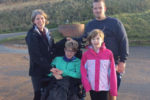Marking Anti-Bullying Week (14-18 November), Kelly from the NSPCC shares this latest news. Ed
In 2015-16 Childline provided 853 counselling sessions to young people on how to help another child being bullied
Childline has launched a new video on its You Tube channel to help children support friends who are being bullied.
It features vlogger Marina Joyce who was once bullied herself, talking about the signs to look for if young people are worried a friend is being bullied, such as withdrawing from their friends or social media.
Advice for children
The advice for children and young people experiencing bullying includes:
- Tell an adult you can trust such as a teacher or parent
- Calling Childline for advice and support on 0800 1111
- If online, don’t be afraid to block and report the person
- Don’t react, show the bullies you don’t care and they will often lose interest
‘What children are telling us about bullying’
The video coincides with the charity’s latest report ‘What children are telling us about bullying’ (see below) which reveals the number of children and young people tormented at the hands of online trolls has increased by 88% in five years.
In 2015-16 Childline counselled 4,541 children about online bullying, compared to 2,410 in 2011-12.
In a quarter of counselling sessions children and young people were also counselled for a mental health and wellbeing issues, including low self-esteem, self-harm, suicidal thoughts and depression.
Children as young as seven told Childline counsellors how they were being hurt by malicious messages from which they felt there was no escape.
Online area for those being bullied
A dedicated area about online bullying has been created on the NSPCC’s Childline Website; for young people to share their experiences and offer support to their peers through message boards. Last year alone there were more than 11,000 posts about online bullying.
This forms part of the charity’s partnership with the Royal Foundation Cyber-bullying Taskforce to develop new tools and technology for children and young people to tackle bullying.
Peter Wanless, Chief Executive of the NSPCC said:
“Online bullying is one of the biggest child protections challenges of this generation. It is a problem intensified by the ever-increasing presence of the internet. Years ago a child could escape their bullies when they left the playground and get some respite in the safety of their home, now the 24/7 nature of the internet means that a child can be targeted around the clock.
“Bullying, regardless of whether it occurs online or in person can have a devastating impact on a young person, affecting their self-worth, leave them feeling isolated and potentially being a trigger for depression. In the worst case scenarios, bullying has driven children and young people to self-harm and even suicide.”
Imperative that adults, parents and teachers intervene
Dame Esther Rantzen, President of Childline said the report has to act as a wake-up call:
“Bullying can wreck young people’s lives, especially now that the bullies don’t stop at the school gates. Cyber-bullying can follow them home until it becomes a persecution they cannot escape. It is imperative that adults, parents and teachers, intervene to protect them, because we have learned over the years from Childline callers that bullying does not stop on its own, left alone it gets worse.
“Schools must take this problem seriously, and above all children must ask for help. Bullying has been among the top problems children have brought to us since we launched 30 years ago. So children need to be reminded that Childline is here for them day and night, offering confidential help and advice on effective ways to beat the bullies.”
Image: graficmedia under CC BY 2.0





